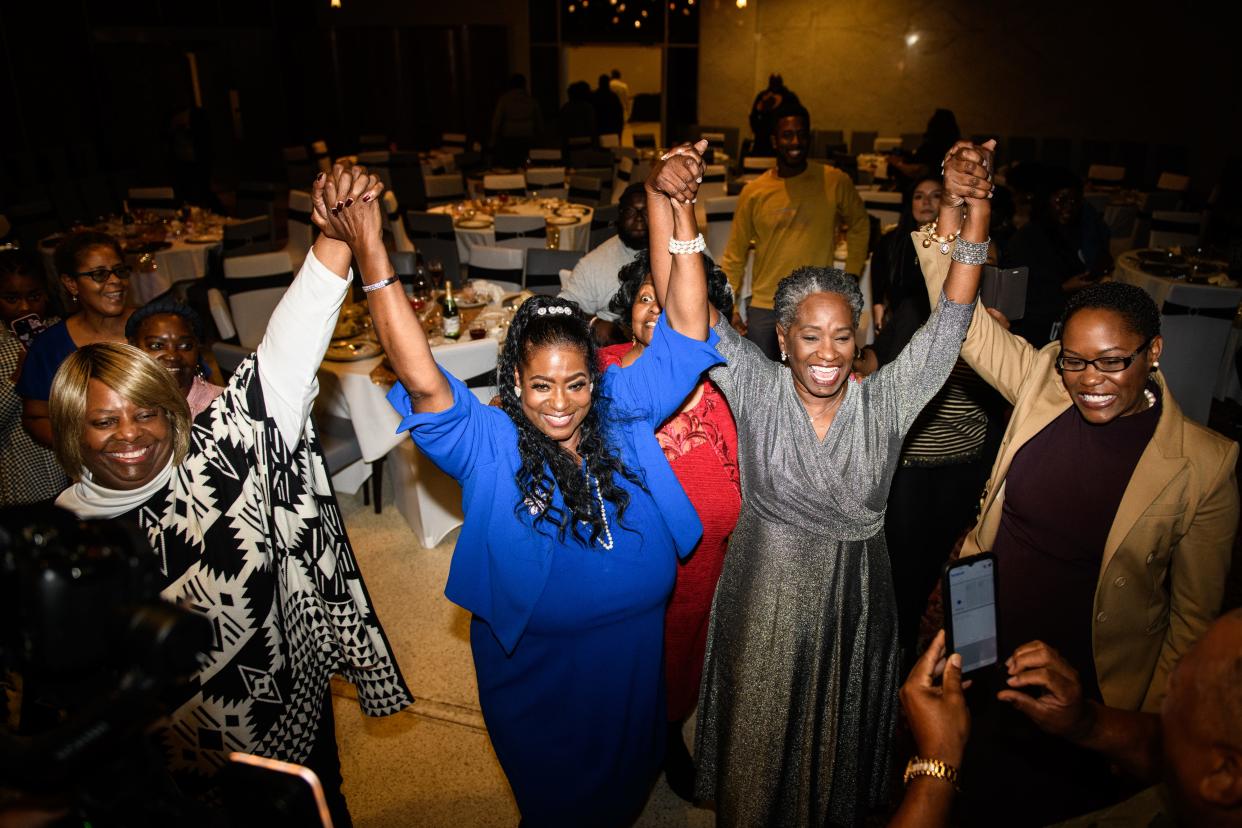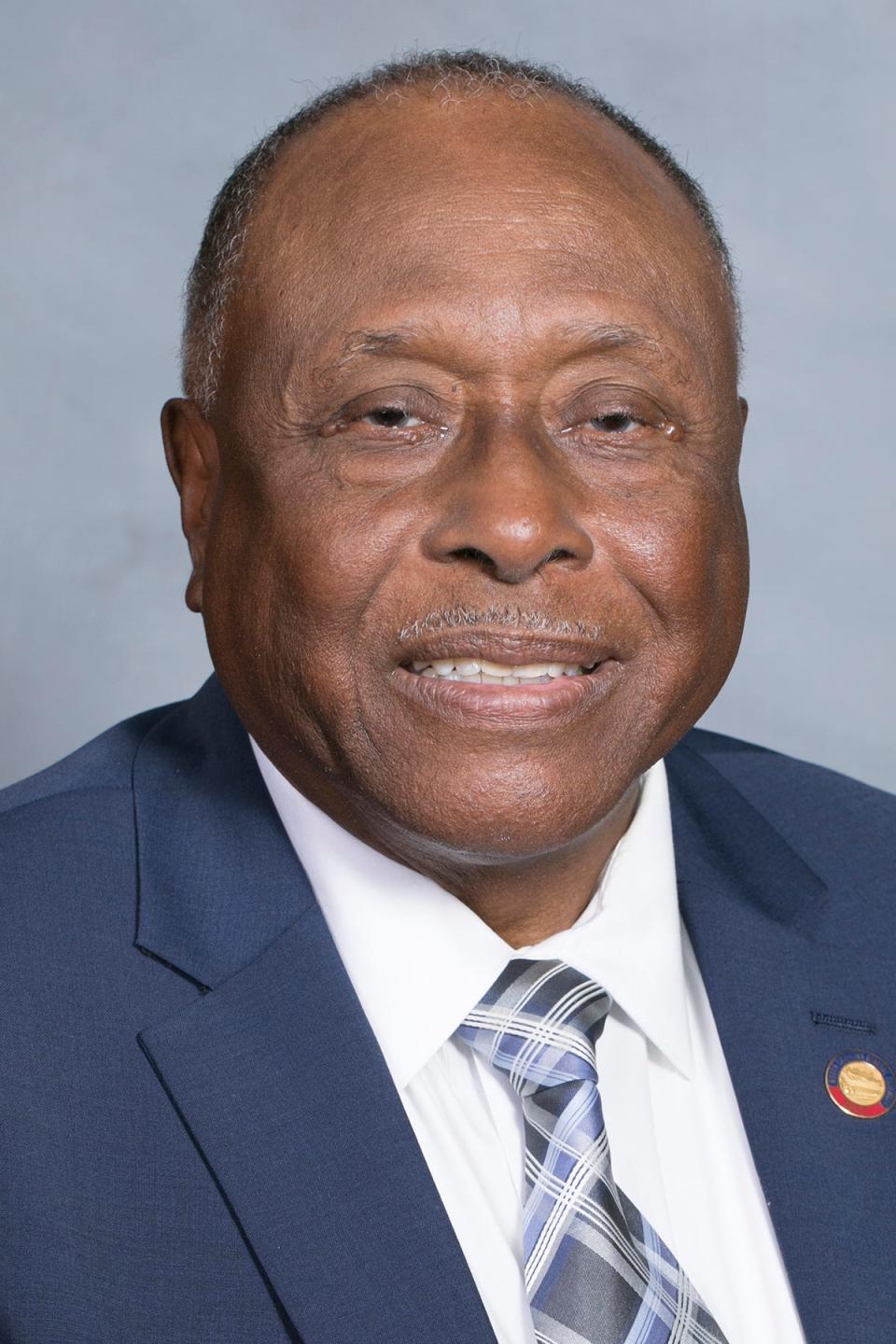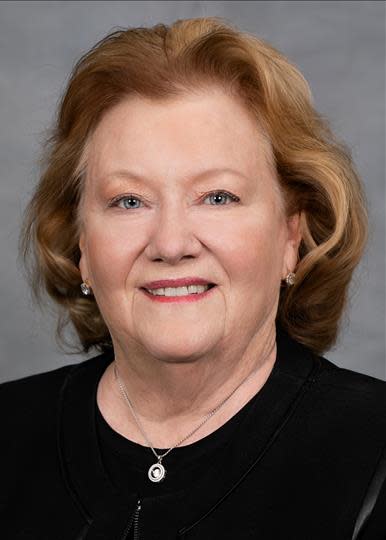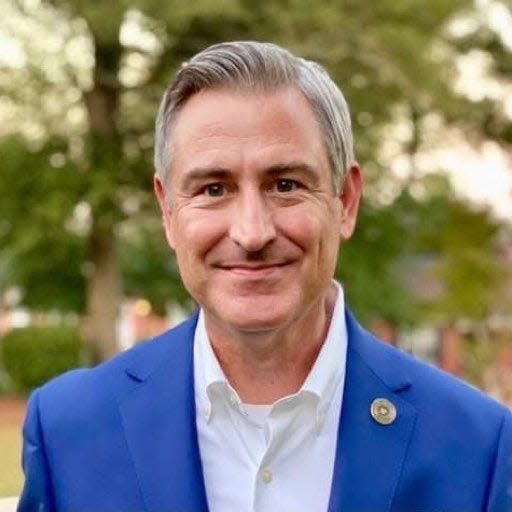Pitts: Why ‘Vote Yes’ failed in Fayetteville and other midterm thoughts

- Oops!Something went wrong.Please try again later.
The “Vote Yes” referendum to change the Fayetteville City Council went down in flames on Tuesday night, with 56% of city voters casting “no” votes and 44% in favor.
Vote Yes organizers were seeking to get rid of four district seats on the Council and add four at-large seats, or seats elected citywide.
I did not know what to expect.

But what sank the effort I believe are three things:
• It was the wrong group who put it forward.
• It was the wrong time.
• It was the wrong way to do it.
More:Fayetteville voters reject ‘Vote Yes’ referendum to change City Council structure
Vote Yes made many folks in the Black community concerned from the get-go because it came along in 2020, not long after city voters had elected eight Black members out of 10, and in a year that was partly defined by the Black Lives Matter movement. A similar move to add at-large seats years ago was struck down by the Justice Department under the Voting Rights Act because the DOJ said it would harm Black voters.
More:PHOTOS: Election Day in Cumberland County
Vote Yes was organized by a group that included former Mayor Tony Chavonne and past, white council members, some of whom had been defeated in prior elections by Black people who were, in 2020, serving on the council. Chalmers McDougald, a former council member who is African American, joined up early on but dropped his support. Vote Yes advocates focused on crime as one reason to change the council structure.
I contrast the Vote Yes effort with the successful advocacy to build the N.C. History Center on the Civil War, Emancipation & Reconstruction. That project was greeted with deep skepticism by some Black members on the council. But last month, the council approved, by a vote of 9-0, conditional financial support for the center.
The difference? The History Center supporters sought the input of the Black community from early on — years back — and listened and changed over time, including the name of the project. They made the project into a community effort and deftly avoided any appearance that it was a small group of white people trying to impose their will on the rest of the city — a city that includes a plurality of Black, registered voters.
More:Newcomer to join Cumberland County Board of Education; incumbent ousted
There is room for at-large seats on the City Council, but an effort that involves all of the community is what is needed to make it happen.
Here are some other observations as I survey the scene of local, state and midterm elections.
Sad turnout
The voting turnout for Cumberland County was 39.5% in unofficial figures. I’m not trying to be mean — but that’s pathetic. It is down from the last midterms in 2018 which was 42%.
More:Newcomer to join Cumberland County Board of Education; incumbent ousted
This year we had a woman from Fayetteville running for U.S. Senate, Cheri Beasley, a former state Supreme Court chief justice. That should have fired up local folks to go cast their ballots yay or nay.
To nonvoters, I say once again: Think of all the billions spent to try to sway your vote; that’s a sign of how valuable it is — the power that you have in your own hands. Use it.
More:Wright wins second term as Cumberland County sheriff
For those who voted, I applaud you for doing your part for our democracy.
Triple-sweep on bonds
That said, city officials have to be ecstatic that voters went for all three referendums that comprise the $97 million bond package for public safety, infrastructure and housing.
All of the bond votes won comfortably, too. I can say that fact surprised a few political “old hands” around here. People aren’t usually so enthusiastic about backing a measure that will raise property taxes.
But one person I talked to speculated that voters might have been influenced by recently seeing the fruits of the highly successful parks and recreation bond, which passed in 2016.
Just last month, that bond money opened the new and impressive Bill Crisp Senior Center in west Cumberland County. In recent weeks, plans were unveiled for bond-funded projects that include a senior center near Murchison Road and a tennis and pickleball center, near there.
Abortion and the veto
On the state level: The issue of abortion in North Carolina will stand pat, for now. Democratic Gov. Roy Cooper will retain his veto of the Republican-dominated legislature by a very slim margin — perhaps by a single vote in the state House if election results hold.
North Carolina is one of the few states in the southeast where abortion is still legal up until the 20th week. So our state standing pat has implications for many women across the South.
I have heard that on some issues, like abortion, the GOP will be able to convince a couple of Democrats to join their cause and override the governor.
For North Carolina Democrats, opposing their party’s governor can be perilous business, however. We saw that locally when Cooper in the spring endorsed former City Council member Val Applewhite over Sen. Kirk deViere in the Democratic primary for Senate District 19. The move was allegedly for what, on balance, looked like pretty minor instances of deViere not towing the party line.
Cooper’s name has been bandied about for a presidential or vice presidential contender. That could influence his relative partisanship, too, perhaps making him even more likely to try to keep all the Democratic oars rowing in the same direction.
For her part, Applewhite did not waste her shot. She defeated Wesley Meredith on Tuesday, and I was not surprised. For one, she simply ran a superior campaign. For two, Meredith — who has now lost three straight times for that seat — did not campaign with the fierceness and frankly, nastiness we have seen from him in the past. When it comes to campaigning, I see him as a former Chicago Bulls Jordan who is now a Washington Wizards Jordan.
Roe your vote?
On the matter of abortion: We will have to look at the numbers, but I believe the issue of reproductive rights staved off what some national election pundits predicted would be a “red wave” for Republicans. A groundswell of young voters was energized this cycle, and all indicators are that in several key races, they voted and made a difference.
Whatever the cause, there was no red wave. Biden is on track to lose the fewest number of Congressional seats in a midterm election, for a first-term Democratic president, since Jimmy Carter in 1978.
With numbers still coming in, the Democrats look likely to retain the U.S. Senate. The House is very much up in the air with Republicans favored to take it — but by much slimmer margins than predicted.
When the U.S. Supreme Court overturned the landmark Roe v. Wade in June, the conservative justices achieved a long-held GOP priority. But it was also a case of the dog catching the car, and the Republicans will have to figure out how to play defense on abortion rights after having played offense for so long.
Nationwide, several states where abortion changes were on the ballot made protections for abortion stronger, according to Axios.
California, Michigan and Vermont enacted permanent protections. Voters in red-state Kentucky rejected an amendment that would have said the constitutional right to an abortion does not exist. Polls show support for abortion, already at majority support, has grown since the Supreme Court ruling in the case of Dobbs v. Jackson Women’s Health Organization.
Big gerrymander coming?
The state courts are one area where the Republicans have much cause to celebrate. They secured a majority on the N.C. Supreme Court and won every statewide judicial race.
That means this state’s highest court could revisit or overturn several decisions. Among them could be new state legislature and Congressional maps that the Republican-dominated General Assembly may submit.
Some political observers believe the GOP has an opportunity to power through heavily gerrymandered maps that tilt elections toward their party well into the foreseeable future.
End of the dream team
Looking at our local representatives to the N.C. General Assembly: This election marks a final, wistful footnote for our former, bipartisan “dream team.” I am speaking of the four Democrats and two Republicans who worked across the aisles — in spite of the deeply partisan tenor of the times — and in 2021 brought back a historic amount of money to Cumberland County. It was $412 million, but who’s counting?
Rep. Marvin Lucas and Rep. Diane Wheatley, who both won re-election, are the only ones who will remain in office after January.


Republican Rep. John Szoka (District 45) lost his race Tuesday for Cumberland County commissioner, placing third in a race for two seats. A lot of people liked Szoka, who is a steady, reasonable person; the kind of moderate people say they want. But I think the “R” behind his name sunk him in this blue-leaning county.
Democrat Frances Jackson won the District 45 seat over Republican Susan Chapman.
Meanwhile, Sen. Ben Clark lost his long-shot race to U.S. Congress in an unfavorable district for a Democrat.

Democratic Rep. Billy Richardson is retiring and not seeking election. He is an avid Tweeter and re-tweeter if you want to keep up with him. Charles Smith ran unopposed Tuesday to win that seat, House District 44.
DeViere, as I mentioned, lost in the primary — I still see him everywhere.
A new commissioner, and her mom
For Cumberland County commissioners, newcomer Veronica B. Jones led all vote-getters in both the Democratic primary and in Tuesday’s general election for an at-large seat. She won one of the two seats. The other was secured by Democrat Marshall Faircloth in a return to the board.
I interviewed Jones for Candidate Conversations, a video series the Observer staff did in conjunction with WIDU radio station, 99.7 FM and 1600 AM. Jones came into the studio with her mother, who sat in for the interview.
I was running late — having just received somewhat upsetting news — then my laptop crashed where I had my prepared questions. Jones and mom were patient during the whole deal, but what I liked most as a family man and as a big fan of my own parents, was that she brought her mom in the first place.
It helped that her mom reminded me of my own, and all have a connection to Beauty Spot Missionary Baptist Church. Her mother, Ruby Jones, who is retired, has been working in her daughter's campaign, handling campaign finances as one of her roles.
Anyway, we will see how Jones handles herself as a public servant — clearly, she has many people who believe in her.
Myron B. Pitts can be reached at mpitts@fayobserver.com or 910-486-3559.
This article originally appeared on The Fayetteville Observer: Pitts: Why ‘Vote Yes’ failed in Fayetteville, and other midterm thoughts

